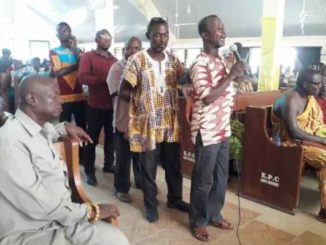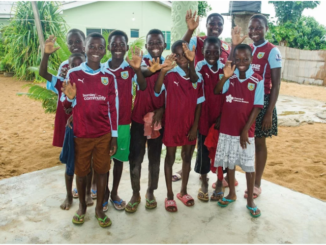
In their eighth month of pregnancy, women living at Mafi-Dove, a town in the Central Tongu District of the Volta Region are compelled by custom to flee to secure a safer place to be delivered of their babies.
For centuries, these women, who have become victims by birth and settlement, have lived under the “spell” of either losing their babies right at birth or accepting to raise children with mysterious diseases should they deliver in their community mistakenly.
As a result of the implications of the taboo, pregnant women in Mafi-Dove are forced to leave their husbands and embark on a tortuous journey across the Volta Lake to Adidome, the district capital and other neighbouring towns where they can give birth peacefully.
This has been the generational ordeal of women at Mafi-Dove ever since its founder, Gbesi Akiti, a hunter, declared the land holy and consequently barred child birth, rearing of animals, and burying of the dead in the town.
The belief has been upheld to the extent that even when a clinic was constructed in 2018 and located on the outskirt of the town, with a maternity ward attached to it, some women in the area still feared to go to the facility to give birth.
She was speaking when the Minister of Gender, Children and Social Protection and the UNFPA visited the community to donate health equipment to the Mafi-Dove Clinic.
The Minister of Gender, Children and Social Protection, Mrs Cynthia Morrison, who was visibly worried about the statistics of teenage pregnancy in the district described it as shameful and unacceptable.
She stressed that mothers in the area had a major role to play in securing the welfare of their daughters irrespective of the negligence on the part of their husbands.
She, however, tasked the Member of Parliament (MP) for Central Tongu, Mr Alexander Hottordze and the Queenmother of Mafi-Dove, Mama Hlorfasi II, to take urgent steps to reverse the “devastating trend.”
The steps that needed to be taken, she said, included intensifying education on the subject, constantly engaging teenage girls to unravel their concerns and sanctioning men who engage in immoral sexual practices with the teenage girls.
Teenage pregnancy
Although it is a taboo to deliver in the community, the irony is that teenage pregnancy in Mafi-Dove is surprisingly high.
Statistics from the Central Tongu District Health Directorate indicates that the district, made up of more than 340 communities with an estimated population of 60,000 recorded 490 cases of teenage pregnancy in 2016.
Also in 2017, a total of 522 cases were recorded, representing 19 per cent of the total number of cases recorded in the entire Volta Region, which is made up of 25 districts.
The Central Tongu District Director of Health Services Ms Justine Sefakor Alornyo, who took delivery of the items donated to the Mafi Dove clinic, described the trend of teenage pregnancy as a blot on the successes chalked up by the district in the area of maternal health over the years.
“Teenage pregnancy is one of the troubling issues in this district. We do not have records indicating how many of such cases came from Mafi-Dove but the issue cuts across all the communities within the district. If we should take a walk through the community, we will identify mothers as young as 14 years old,” she stated.
The assemblyman for the area, Mr Moses Kwasi Awukuvi-Davanyevor confirmed that teenage pregnancy was prevalent in the Mafi-Dove community. He mentioned lack of parental control, inadequate education on the subject, and increasing economic hardship as major contributory factors to the rise in the canker.
–
Daily Graphic



